Craft roots keep Lisbon Design Week on the cutting edge
Compared to showcases in other European design capitals, Lisbon Design Week is a more intimate affair that celebrates the closeness of its craft traditions.
As the third edition of Lisbon Design Week kicks off across more than 90 venues today, it’s clear that Portugal’s craft culture is the event’s defining strength. Running until Sunday, the event focuses less on polished brands and sleek product lines, and more on the tactile stories behind each piece and participating project.
While other European creative scenes trade off their industrial manufacturing prowess, a lack of major furniture brands and clearly established career pathways means that many Portuguese designers pay more attention to materials, techniques and connection – to the land, to traditions and to each other. The result is a creative culture of experimentation and learning by doing. For many, this involves stepping away from computer screens and into workshops, where artisans take a hands-on approach to making furniture and objects, exploring traditional and innovative techniques with freedom.

For Portugal-based French designer Noé Duchaufour-Lawrance, this allows him to explore beyond the expectations of his established practice. His “Made in Situ” project – on show at Lisbon Design Week – creates designs using a location’s raw materials and knowhow of local craftspeople. Such work doesn’t allow production at scale but still finds a market as a new generation of interior designers seeks to furnish projects with pieces that reflect a sense of place. The heads of international buyers are also turning as they look to take away a slice of the Iberian peninsula.

This year’s edition of Lisbon Design Week also encourages collaboration between collectives such as Bora and Luso Collective, the latter founded by Tomás Fernandes and Natasza Grzeskiewicz (pictured above left), and disciplines from wood and glass to ceramics, textiles and metal. Visitors benefit from these exchanges too, with much of the week’s programme unfolding in working ateliers where audiences get to meet people rather than brands. Even in commercial venues, the directive is to host a maker and shine a light on a craft: event attendees will be able to see ceramicists working in the windows of real-estate offices while showrooms stage live tapestry stitching.
Such events are a reminder that, unlike other European design capitals, Lisbon’s design scene is typically more intimate, open and accessible. And while there is still plenty of room for growth and professionalisation, as well as more top-down support, staying close to its craft roots has paid off so far.
Lutz is Monocle’s Lisbon correspondent. For more design news and analysis, subscribe to Monocle today.



